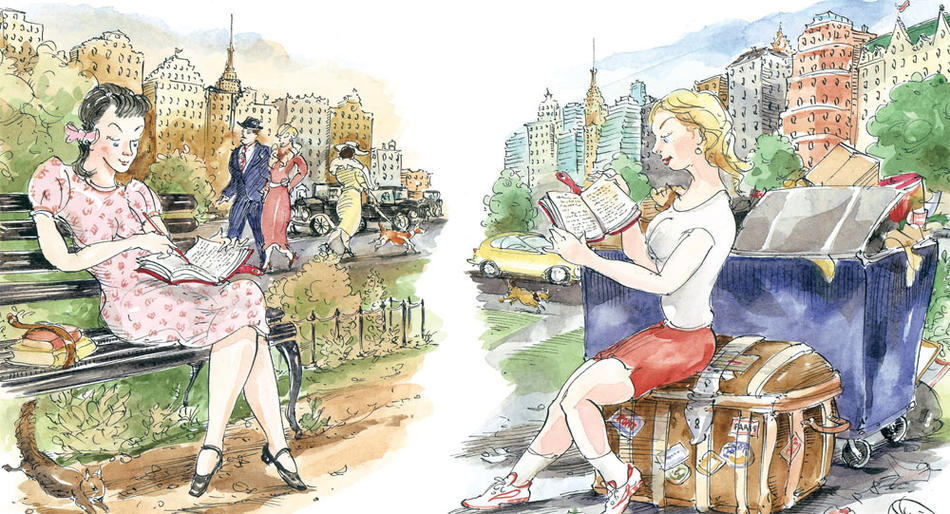First, she did the New York Times crossword puzzle. The paper was delivered every morning to her condo on the golf course in Pompano Beach, Florida. After the paper, she would watch the palm trees sway and wait for the arrival of her aide. A few afternoons a week she played bridge. Evenings she stayed home. At 90, she was 10 or 15 years older than the others in her bridge group. Her husband, Nat, in his mid-90s, was fading. She missed her friends, who had either died or suffered from Alzheimer’s. All told, Florence Wolfson Howitt ’36GSAS was leading what she called “a boring life.”
Then, one Sunday morning in 2005, the phone rang. Florence picked up and heard a young woman’s hesitant voice say, “Florence?” “Yes,” Florence said, and then listened in astonishment as the woman explained that she had found, in a discarded steamer trunk in a Dumpster on Riverside Drive in Manhattan, Florence’s long-forgotten teenage diary. There was also a telegram addressed to Florence Wolfson that read: “I love you. Nat.”
Now the woman was saying that she wanted to write Florence’s story.
“Oh, my God,” said Florence.
The caller was Lily Koppel ’03BC, a 22-year-old writer for the New York Times. Koppel had kept Florence’s crumbling diary in a plastic Zabar’s bag for three years in hopes of finding its writer. Now, thanks to the work of a private investigator, Koppel was afforded the strange pleasure of being able to read Florence a passage: “Have stuffed myself with Mozart and Beethoven. I feel like a ripe apricot.”
Asked later about that ecstatic fragment, Florence said, with wonder and a little embarrassment, “What 14-year-old girl feels like a ripe apricot?”
Florence would soon become reacquainted with that passionate, precocious, privileged girl. In interviews on Sunday mornings over bagels and lox, Koppel used tidbits of diary entries to trigger Florence’s memory of the years 1929 to 1934, between her 14th and 19th birthdays, when she faithfully wrote a few lines every night about her whirlwind life in New York, her quarreling Russian-Jewish immigrant parents, her intellectual adventures, and her loves, both male and female.
During summers in the Catskills, Florence met Nat Howitt — “as handsome as a Greek god” — whose parents owned the hotel at which she stayed. They met when she was 13, first kissed (duly recorded in the diary) when she was 16, eloped when she was 24, and stayed married for 67 years until he died a year ago at the age of 97.
Because the Depression kept her from going away to school, Florence applied to Barnard. Dressed in a tuxedo jacket, a skirt, and one of her father’s black ties, she was rejected for being, as she would later recall, “too brilliant and original.” After graduating from Hunter at 19, Florence went on to get her master’s degree in English at Columbia, where she studied with Mark Van Doren ’21GSAS.
The result of Koppel and Florence’s careful reconstruction of Florence’s life in 1930s New York is The Red Leather Diary, a book written by Koppel and published in April to a flurry of publicity.
“I’m not invisible anymore,” Florence said by phone recently as she rested in bed for her upcoming appearance on NBC’s Today Show. “Now people listen to me.” Vibrant and stylish, her still-beautiful face punctuated by black-framed, violet-tinted eyeglasses, she’d already charmed audiences at three packed book talks and held court at a party in a trendy West Village gallery. “Lily resurrected me,” she said. “It’s because of her that this whole fairy tale happened.”
On the set of the Today Show, she settled into her chair and “never even thought of the people watching.” Afterward, she waved to the crowd on the sidewalk. “I think I’m a real performer. I’m finding that I’m comfortable in myself, which is a good thing to know.”
Rereading the diary and reliving a colorful life that included a literary salon in her parents’ West Side apartment — poets John Berryman ’36CC and Delmore Schwartz were frequent guests — led her to wonder wistfully in interviews, “Where did all of that creativity go?”
In Florence's case, it went to Connecticut.
After writing briefly for women’s magazines, Florence settled into the discreet bounds of domesticity and moved to Westport, Connecticut. There, she “played tennis, bridge, and the stock market” and developed “a country club mentality.” But she doesn’t think it was motherhood and the suburbs that dampened her literary ambitions. “I tried to sell two books (one called Are Husbands Necessary?), and no one was interested. It was reality, not the suburbs.”
When asked what she thought of the younger Florence, who frankly recorded her sexual encounters as well as her fashion experiments and literary dreams, she said, “I thought she was admirable. A free soul. Later I became pretty settled and conventional.”
Now 93, Florence is flourishing in the limelight that eluded her in her youth. She gets letters telling her how wonderful she is. At book signings, people are amazed by her vitality and quick wit. She has hooked up a laptop computer (not as glamorous as the purple and lavender Remington typewriter with French accents she used as a student) and is thinking of writing the story of her reclaimed life. She might even dye her hair blond again.
Asked about the best thing to come of this gift from the Dumpster, her voice softens: “The telegram Lily found from Nat. I didn’t think he was ever so romantic. After 67 years, it’s nice to know.”



